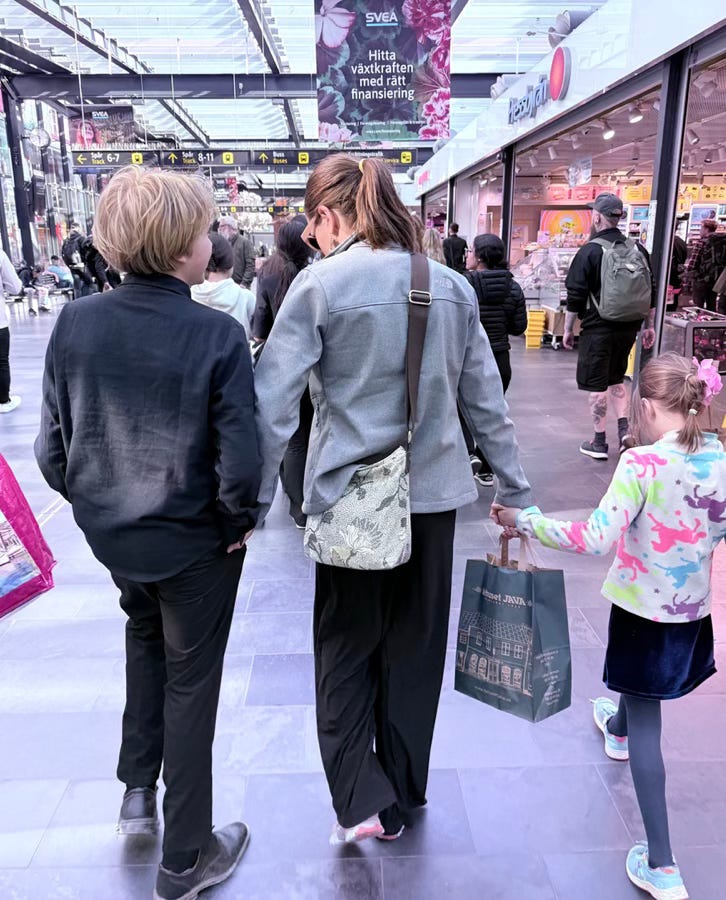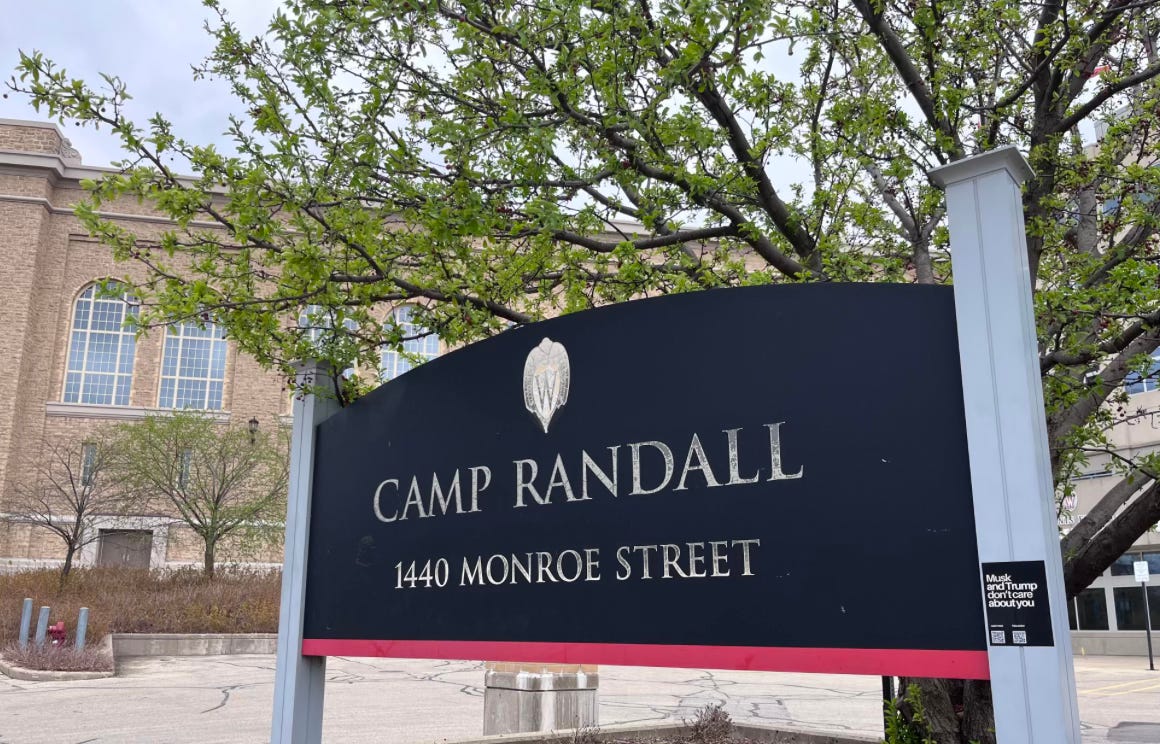I regret to inform the United States of America that it is stuck with me for the foreseeable future
On when "stay or leave" isn't actually the most important question
I have no idea what it actually feels like to flee a country. I’m sure, as is the case for so many experiences that are common for many but foreign to me, that my mental map of the experience is too heavily indebted to movies and books. Do migrants at the border really take one last cinematic look over their shoulder, wondering when they’ll see their home again? Surely some. But life is not cinema, and we are not main characters. I imagine that when you’re leaving, you are fortunate if you have the wherewithal to turn your head around for a second. Objects in motion stay in motion, often out of necessity.
Last week, I was overseas, in somebody else’s country. I was in southern Sweden for a memorial service, a celebration of a man who was essentially my wife’s Swedish father. The funeral was lovely, and it meant a great deal to Anders’ loved ones that we had come that far. We hugged and laughed and cried and drank wine and ate little slivers of gravad lax on crackers and the kids hung out upstairs with big bowls of sour cream chips and pick-and-mix godis. What a gift, to love and be loved in a place that is not your home.
While we were gone, much attention was being paid, back in the U.S., to the issue of white people crossing borders. In Alabama, Afrikaner farmers wheeled carts full of Samsonite luggage through the corridors of an airport named for a civil rights hero. This is their country now, these fearers of a Black planet. This land was made, neither for you nor me, maar vir die Boer. Meanwhile, in the New York Times, three famous academics explained why, as scholars of authoritarianism, it was time for them to leave the U.S.. I was only partially following both stories, given the reasons behind my trip, but my sense of the first is that there’s little to analyze. There’s no subtext, only text. Welcome to the Boers, the sole recipients of sympathy under Pax Trumpiana.
As for the second, there has been a predictably active debate about the notable fascism observers who henceforth will now keep their watch from across Lake Ontario. Are they cowards and hypocrites? Should others heed their warning and leave as well? Or are they abandoning us too soon? And what is all this, the leaving and getting an audience for their decision, if not a mark of their immensely privileged social position? I mean, how many tenure-track appointments are available at the University of Toronto? Could a few hundred million of us team teach an introductory composition course? University of Toronto administration, if you’re reading this, let us know.
I actually don’t have an opinion on this particular decision to jump ship for less authoritarian shores. That’s fine for them. I do have opinions about the necessity of grandiloquent op-videos about one’s decision to do so (even Lena Dunham had the good sense to just write a Didion-aping essay about how she likes London now, rather than a multimedia Goodbye To All That Fascism spectacle), but if a Times video crew approached me with a pitch for “I’m the author of a moderately popular newsletter about being nice to each other, here’s what I’m having for breakfast” I’d at least consider it.
But when it comes to the quiet, fraught decisions made by the non-celebrities among us, I trust we’re all just doing our best. I know and love many people who have made every variety of stay vs. leave decision. I love people who came to the U.S. under duress— fleeing poverty or dictators— as well as others leaving the U.S. for strikingly similar reasons. I love people who departed small towns and red states because they were physically unsafe, or couldn’t make decisions about their own bodies, or had to lie about a core part of their identity to gain acceptance. I love Black Americans who live overseas and queer Americans who will never return to their hometowns. I love people who fled abusive relationships and abusive power structures. I love people whose homes no longer exist— swept away by fire or flood. I love people whose religion, ethnic background or immigration status means that the question “when will we flee?” is always rattling in the back of their mind. I love people who would love to leave but are broke as hell. It is true that, in many circumstances, the ability to leave is a privilege— one aided by race and class and social networks. I also know that, for so many flee-ers, the ability to bloom where you were first planted is the most elusive privilege of all.
There may come a time when it’s useful for me to have an opinion about whether others should stay or leave, but, for now at least, I don’t find much value in casting judgment. I can’t imagine that it’s a decision people take lightly.
All that was happening stateside though. Back in Sweden, there were questions, for me and my wife.
“So why don’t you leave? Why don’t you move here?”
They kept coming, at every single gathering. Truth be told, previous to this past week, we hadn’t thought that much about it. I mean, Kjersti and I have wondered what would it take to transfer her professional credentials to another country, but in a way that still feels distant and theoretical, much like imagining how we’d react to the world’s worst earthquake shaking our non-seismically significant home in Milwaukee. We’ve whispered to one another, but in that hazy manner where you never quite finish the sentence.
But last week, the question wasn’t posed theoretically. And I’m sure part of it was convivial politeness (“you guys should totally move to Sweden” being cast off the same way that summer camp teens make a soon-to-be-forgotten pact to all apply to the same college), but there also seemed to be a genuine degree of incredulous concern. “Why wouldn’t you come here? It’s so bad there, and Kjersti is fluent in Swedish, and Garrett can work from anywhere, so what are you even doing?”
Our friends never asked in front of the kids, which is why I was taken aback when we received the same query from one of our children. We were lounging in a well-appointed playground, having just made a visit to Malmö’s gorgeous public library— a light-filled cathedral of social democracy if ever there was one. The weather was merely fine, not great, but our bellies were full of fika and we were content in that way you are when you are play-acting somebody else’s Saturday routine. Our twelve-year-old lay on the grass next to us while his younger sister climbed on a nearby rocket ship slide. He made that face he does when he’s considering something weighty. He too wasn’t asking theoretically.
“Mom and dad, why don’t we move to Sweden?”
“Tell me more about that question, bud. What’s on your mind?”
“I mean, I know that Sweden isn’t perfect, but it feels so hard going back to a place that doesn’t care about its own children.”
A quick aside here. I know full well that there’s an entire genre of Internet discourse around progressive parental boasting. “Listen to this impossibly woke thing that my child said,” doesn’t reflect well on anybody. And so yes, I know how this sounds, but I also beg you to imagine this question being asked in earnest, by a child whose friend group includes trans kids and kids without papers and kids whose parents are in lock-up. And if you can imagine that, I hope you can also imagine what happened in my heart at that moment. An ache, an implosion, a folding into itself.
So why not, indeed? If we were to consider nothing except the well-being of our children, would they be better off in a place where we received a monthly check from the government to attend to their well-being, where their college and healthcare would be paid for through everybody’s taxes, where they could bike around without fear of being hit by a car, and go to school without fear of being shot, and not have their parents constantly typing queries into search bars about “what stage of fascism is happening today?”
Among the million things I adore about my wife, she is a portrait of integrity, in all moments. When faced with a question like that, especially from a child, she doesn’t toss off an answer that she only half-believes. And so she gave him an honest reply— one which we had never named for each other but that immediacy struck me as being both wise and true.
She talked about how, when her parents moved her and her sister to Sweden (her dad, a professor himself, finagled a sabbatical year in Lund), her family was physically safe(ish), but the question of belonging and thriving was complicated. Back in Idaho, they lived in a town dominated by a high control patriarchal religion. They were not members of that faith, and life on the edges of Zion was not easy, particularly for young women. For my in-laws, the need to give their daughters at least a temporary taste of a different life felt urgent and visceral. Home was not home.
She shared that story as a point of contrast, about how for us it isn’t just that we’re relatively privileged and that we aren’t currently being targeted by this administration. It’s that we— especially our son and daughter— are embedded in a web of caring, gorgeous, messy, but life-affirming relationships that we can’t imagine leaving. “We just feel so lucky that you and your sister go to schools where your friends and teachers care about each other, where you learn Spanish and talk about what’s going on in the world.” Those schools, by the way, are deeply imperfect— underfunded and much ridiculed and asked to be a container large enough to solve a hundred different manifestations of an unequal society. But they have very much been a home for our family, as are so many other spaces, both in this Rust Belt city and this broader sprawling mess of a waning empire.
She said, and I echoed, that for now we are staying not just to fight but because there are people here who care about us and for whom we care. For now, at least, that’s where the puzzle pieces of life and purpose meet, in the intersection of joy and sorrow and dread and not knowing when or if the line will flip between hosting a potluck because it’s the neighborly thing to do and hosting a potluck because there is so little food to go around.
I don’t know if that’s a good reason, by the way, but I know that it’s our reason. I don’t have any grand op-video proclamations about how to survive this moment, but I do know that when we drove to the airport on Wednesday my daughter made me take a picture of a water tower and send it to her teacher. One of her classmates, a good friend “whose brain works a little differently” loves water towers. And so I did what I was told, and it did in fact make another parent’s eight-year-old happy, and I know that so many others would do the same for us.
All that, at least, I know for certain.
Maybe you have already left. Maybe someday you will leave. Maybe someday we will leave, my family. But that doesn’t seem, to me at least, like the most interesting question. I care far less for how you navigate that decision— which is and always will be deeply personable— than what you decide to do while you’re here. If “here,” is reasonably safe for you, how are you making it safer for others? If “here” is a place where you can still make a living, do your job encumbered, or live in relative peace, how do you spread—stone soup style— a bit of that security to others? If “here” is only partially bearable for people around you, how are you tending to spaces beautiful and vibrant enough that your neighbors can at least say “well, that part of ‘here’ is wonderful, at least?”
I’m not bugged that the famous professors are leaving. I’m not even bugged that they made a fancy video. I know they want to help. I know they want to sound the alarm. If I have a critique, it’s that they talk a lot about countering authoritarianism through lofty proclamation, but very little about their friends. I didn’t hear, in that video, about how it’s so hard for them to leave their tool libraries or lovingly dysfunctional places of worship. I didn’t hear their regrets about leaving the youth soccer league without a ref, or how much they’ll miss their Sunday game night with friends. I didn’t hear about how, before they get on the plane, they’ll help their local ICE watch find a new volunteer to take their place. I heard a great deal about making history, but nothing at all about making a neighborhood.
It’s telling, what we talk about, when it’s time to tell our story.
We are not main characters, but we can’t help imagining life as if we were. And so as our train to the Copenhagen airport crossed the Öresund bridge, I did look over my shoulder, at a country I was leaving in decidedly non-dramatic fashion. I allowed myself my own moment of cinematic self-importance, imagining what it would be like to gaze at Milwaukee one last time, to see the Hoan bridge grow tinier and tinier in the distance. I bet that it would be heart wrenching, but I also know that life here is heart wrenching for so many of my neighbors in the here and now. To leave a place you love is unbearable, but no more so than living in a place that doesn’t love you.
We are not the main characters. We are sharers of space. Some of us have a choice to stay or leave, but not all of us. What we all have in common though, is our ability to make a whole slew of other choices. How wide to open our arms. Who we welcome in. What life looks like in the million ‘here’s’ that we still get to build together, wherever we land.
End notes:
As you know, I absolutely love our discussions here, particularly how free they are from the sniping and posturing that typifies so many internet spaces (and yes, making them for paid subscribers only helps, but you all still create the space and for that I’m grateful). I’ll just note that this particular topic can bring out some very strong feelings, so thanks in advance for treading with love and curiosity for each other if you do want to discuss.
New Barnraisers Project classes will be announced very, very soon (next week? late this week? yes, one of those). Sign up for the interest list and you’ll get the announcement email very soon.
The raffle/giveaway for paid subscribers to get some fun thank you merch from me will close tomorrow night, which means that there is still time for you to become a paid subscriber and get in on the fun (after becoming a subscriber, you’ll need to click on the link in this post to officially say “yes, I’d like one of those, please”). Here’s the designs again, for reference. And yes, this is also where I remind you that this is my day job and I know it’s kind of a bummer to have lots of newsletters soliciting you for money, but also I’m a believer in asking for the help you need and trusting a community to pitch in. That’s to say, I appreciate you all.


4. Speaking of things I like sending out to people, here’s this week’s “Musk and Trump don’t care about you” sticker in the wild. This one was placed pretty close to me— at Camp Randall Stadium (home of the Badgers) in Madison, Wisconsin. Every time I see this stadium, I’m reminded of when Kjersti and I lived a block off of UW’s frat row and one night, after a game, there was a rowdy party outside our window (a not uncommon occasion) and the crowd started chanting “DAVE! DAVE! DAVE! DAVE! DAVE!” followed by a pregnant pause and finally the loudest “WHOOOOOOOOOOOO!” I’ve ever heard. This has nothing to do with that sticker or fighting fascism, but Dave, if you’re reading this, please tell me what it was you did in those intervening seconds. Must have been pretty sick, man.
The song of the week comes to us from one of my American ex-pat in Sweden role models, Lee Hazelwood. Listen to “No Train to Stockholm,” friends. Lots of relevant lyrics in this one: “Received your invitation to the war/I sent it back, so please don't send no more/I'd rather rot in some jail all alone.” Also the chorus, of course: “Freedom is where you think it is, but there ain’t no train to Stockholm.”
As always, the full song of the week playlist is on Apple Music and Spotify.






I feel like the racial element is always underplayed in these emigration discussions. I always point out that as a black woman, antiblackness is global and emigration to wealthy, western countries is difficult. I haven’t seriously looked into it, but the little research I’ve done, yeah…it’s not that easy to get an engineering job elsewhere.
Every time someone even jokes about fleeing the country, I get a pang of discomfort because it feels like abandonment? But I am someone who gets depressed even when a colleague I like leaves for another job, so that's probably a personal issue, lol. However, I think the majority of comfortable white people who talk this talk without real intentions or plans to go through on it are, to some extent, fantasizing about no longer having to feel responsible for things that are existentially concerning but not currently affecting their day-to-day. But from what I have heard from many actual ex-pats of multiple countries, the stress of knowing what is going on back home never goes away if you love and care about the people there. I think the sense of responsibility and connection many people are trying to escape is not disposed of so easily.